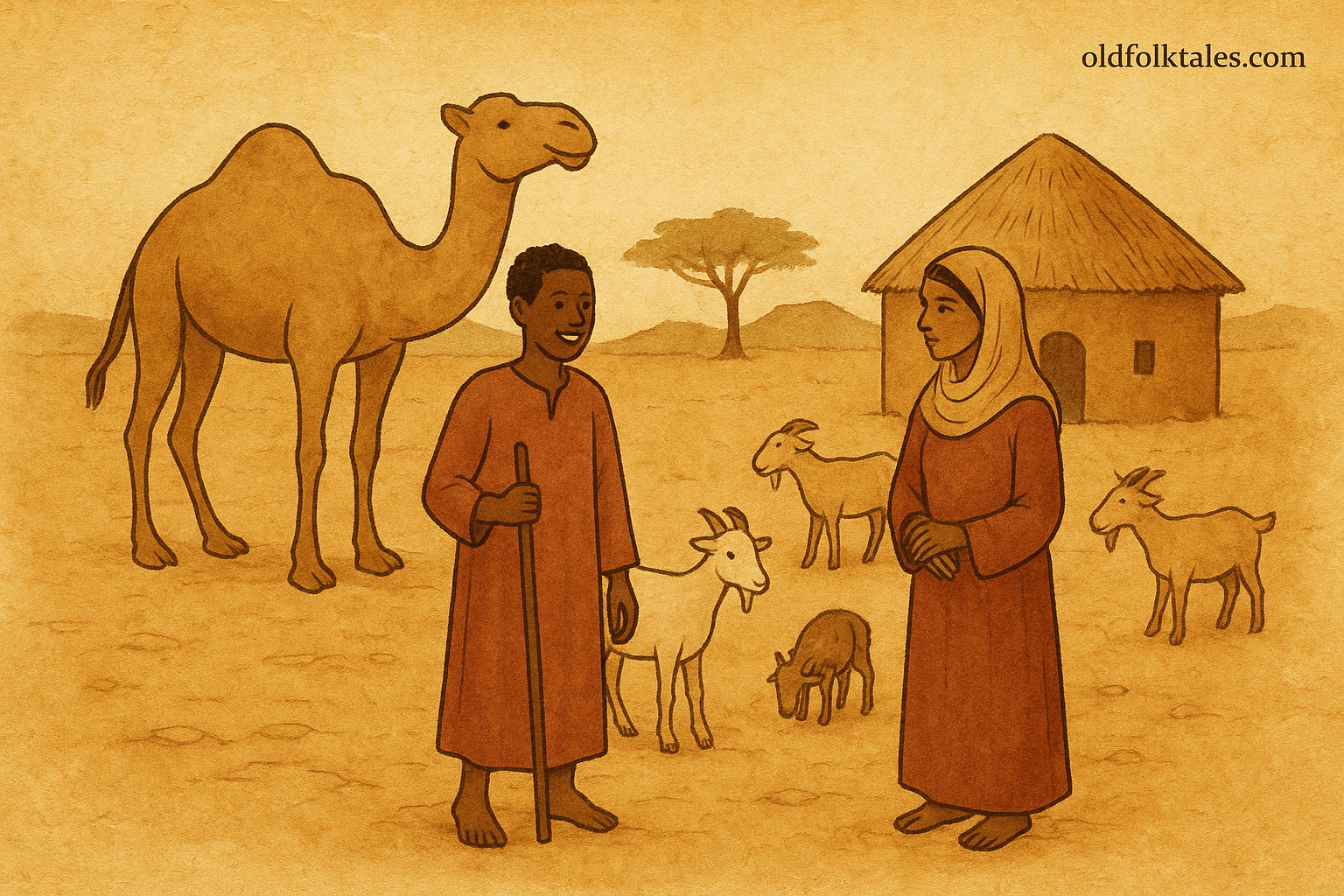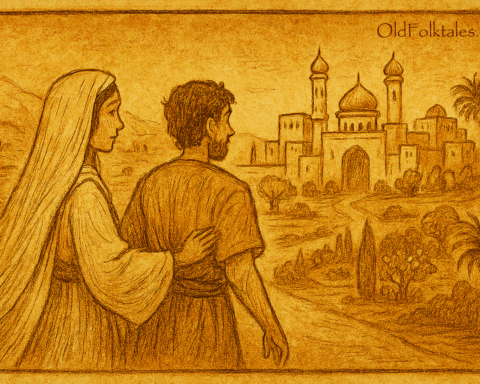Once upon a time, in a village by the wide Somali plains, there lived a young boy named Mohammed Hassan. He had lost both his father and mother when he was very small. They had left him a vast wealth: a hundred camels, a hundred and twenty goats, and eighty cows. Yet, despite this fortune, Mohammed was alone. His father’s brother, also named Mohammed, became his guardian. The uncle was a poor man with only two cows, and he lived with his wife, Ambaro, and four daughters.
From the very beginning, life with Ambaro was hard. She was always angry and shouted at Mohammed for the smallest things. He never told his uncle about the harshness he faced. The boy grew quiet, shy, and careful, afraid to speak too boldly in the house.
Every day, Mohammed helped his uncle’s daughters herd the camels, goats, and cows. Among them, the eldest, Deka, became his closest friend. If she fell or hurt herself, he would gently lift her, treat her wounds with leaves, or make a small splint with a stick. The other children did not like Deka or Mohammed, but these two understood one another deeply. As Deka grew older and helped in the house, she secretly shared food with Mohammed. She would slip him small meals at night, because she knew he had been starved by her mother. Over time, Mohammed felt joy when Deka was near, and the anger he carried toward Ambaro softened, though she still wished he would leave.
READ THIS: The Girl and the Lion
When Mohammed reached a marriageable age, he spoke to his uncle. “I am ready to marry,” he said. The elders gathered to discuss, and the uncle said, “Mohammed now owns the property. He wishes to choose a bride from the village. I am ready to help him find a wife.”
But Ambaro cried loudly, “No! No! This is not right. That wealth has grown because of my care. He is only a child. How can he take it all?”
Despite her protests, the elders wanted Mohammed to marry their daughters. They said, “The boy has property, even though he is an orphan. Everyone wants him as a son-in-law.”
Finally, the uncle explained firmly, “The property is his. If he wants it, he can take it.” The elders decided Mohammed should take half of the property and use it as he wished. He chose to leave for his mother’s relatives in another village, planning to marry there and manage his own wealth.
As soon as he left, Deka fell gravely ill. For three years she remained weak, almost dying. One day, a visitor from Mohammed’s former village told him, “Deka is very sick. Since you left, she has suffered greatly.”
Touched by her loyalty and kindness, Mohammed sold two sheep to buy medicine, clothes, and food for her. When he arrived at the village, Deka, sleeping beneath a tree, saw him and sat up, greeting him with joy. She had become thin and weak, but her spirit brightened at his presence. Mohammed tended to her, offering special food and care. Soon she regained her strength, and Mohammed stayed with her for two weeks before returning to his village. Each time he left, Deka fell sick again.
The elders noticed this pattern. They suggested, “Perhaps she belongs with him. Let her go to his village, and she can help him and care for him.”
In Somali custom, girls did not declare love openly. Deka did not speak her feelings. On the journey to Mohammed’s village, they faced wild lands with lions and other dangers. They traveled with three boys carrying guns. Along the way, Deka killed a small hare and gave it to Mohammed. While giving the meat, she sang a poem, secretly expressing her love. The boys understood and warned Mohammed.
He laughed nervously. “How can I love a sister? She is like a sister to me. I helped her when she was a little girl. Do not say such things.”
When Deka heard this, she fell, hitting her head on a stone. She became gravely ill and could not speak. They carried her to Mohammed’s village, where the elders debated what had happened. The boys explained that Deka had fallen after Mohammed refused her, not because of any harm from them.
The elders realized the truth. Deka had always loved Mohammed, and he had misunderstood her feelings. Once she recovered, the elders arranged their marriage.
When Ambaro heard the news, she protested. “How can they marry without asking us? I do not like that boy!”
Her husband calmly replied, “He has property, and by marrying Deka, the wealth and blessings will return to you. You will become richer than before, and he will remain under your guidance.”
Ambaro agreed, and the families celebrated. Mohammed’s mother’s relatives brought camels and cattle, and both families became prosperous and joyful. In the end, Deka’s love had brought blessings far beyond what anyone had imagined.
Moral Lesson
Don’t Be Too Shy teaches that speaking or showing love is not a weakness. Silence and fear can lead to misunderstanding and pain, but courage and kindness bring healing and joy. True love requires honesty, action, and a brave heart.
Knowledge Check
Who was Mohammed Hassan’s guardian?
Mohammed Hassan’s guardian was his uncle, also named Mohammed, his father’s brother.Why did Mohammed leave his village?
He took half of his property to his mother’s relatives in another village to marry and manage his own wealth.How did Deka show her love for Mohammed?
She secretly gave him food, sang poems, and later offered meat during the journey, expressing her feelings indirectly.What caused Deka to fall ill seriously on the way to Mohammed’s village?
She fell and hit her head after Mohammed refused her expressions of love.Why did the elders decide Mohammed and Deka should marry?
They realized their love was true and that their marriage would unite the families and bring happiness.What is the main lesson from Don’t Be Too Shy?
True love requires courage, honesty, and action. Silence can cause pain, but kindness and bravery bring joy.
Cultural Origin: Somalia (Eastern African Folktale)






